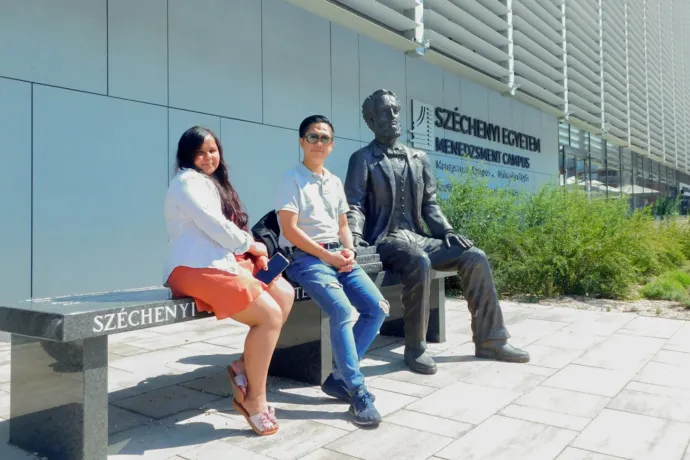
Students from South Korea, India and China (among others) have been coming to the universities in Debrecen and Győr. Ruman, Yohann, Guo and Ela spoke to Telex about why they chose Hungary and what their opinion is of the education here. There is a lot of competition in this market, with Győr and Debrecen competing with more than 25,000 universities worldwide. What are Hungarian universities outside of Budapest doing to attract foreign students from almost unseen distances?
The University of Debrecen accepted 6502 new students this year, being second in line behind ELTE among the Hungarian universities as far as the number of new students is concerned. Széchenyi István Egyetem from Győr has also made it to the first ten. They are seventh on the list, with 3218 new students. There is no point in comparing the two universities, as (for now) they are focusing on different things. An answer to the bracketed comment is coming soon, but it is safe to say that Debrecen is much stronger in humanities, its medical department being especially strong, while due to its past and the presence of Audi, Győr is focusing on engineering.
A fifth of the students in Debrecen are foreigners, while Győr has students from 65 countries
No institution wants to get behind in the competition for foreign students. More than one insider believes that these students will become increasingly important for Hungarian campuses, especially since – whenever possible – Hungarian youth have been going to study abroad. The University of Debrecen has been offering courses in English since 1987, so they have quite the advantage over Győr’s Széchenyi. The answer they sent to Telex also reveals that they have nothing to worry about, since the number of foreign students choosing them has been steadily growing: while in 2018 there were 5664 foreign students in Debrecen, by 2021, their number increased to 7023. Today, 23 percent of their active students are pursuing their education in English.
Széchenyi István University began offering classes to international students 35 years later than the Debrecen institution. Vice President Eszter Lukács informed us that in the last five years, the number of foreign students in their institution has grown from 300 to 900, and their 13 thousand students have come from 65 different countries.

Hungary equals opportunity
We found out quite quickly why Hungarian universities are being considered by Indians or South Koreans: “In India, it is common practice for young people to study abroad, mainly in Europe. There are few opportunities at home." – Ruman, who is currently getting her master’s in supply-chain management at Széchenyi István University in Győr explained, referring to the caste system.
Yohann Lee from South Korea, who graduated from the University of Debrecen as a doctor, and is currently a resident in a Seoul hospital shared a similar story. According to him, getting into the medical university is very difficult in South Korea, so following the advice of family friends, he went to an international high school which has had a long-standing partnership with the University of Debrecen. The school's curriculum was actually tailored to the university's admission requirements, giving Yohann a better advantage than if he had gone to a traditional South Korean school.

They advertise where they can
The Debrecen institution has students from 122 different countries, with most of them coming from Nigeria, Pakistan, Iran, China, Jordan, India and Egypt.
Depending on the training, the tuition cost varies between 6000-17500 USD per year.
Most of the international students at Széchenyi István University are either beneficiaries of the Stipendium Hungaricum scholarship or are paying their own way at one of the nine faculties. The Győr university does not have a relationship like the one mentioned by Yohann from South Korea in connection with Debrecen, so they use advertisements and recruitment agents to reach potential students.
Guo Shaofeng from China didn’t know much about Győr and Hungary, but he was familiar with and loved automotive brand Audi, and he also knew about the vehicle engineering training. This was the reason why he applied to come to Hungary:
“Even in China, everyone knows that Audis are made in Győr. Because of BMW, people will soon know about Debrecen too.”

Will they be competitors?
Most foreign students in Debrecen are studying medicine and healthcare sciences, but according to their communications department, the number of foreign students studying engineering and science is also dynamically increasing.The most popular courses in Győr are in engineering and economics, they are stronger in these fields. But there should be no doubt: just as we have seen it happen in Győr, once car manufacturing begins in Debrecen, it will result in the strengthening of engineering education in Eastern Hungary as well.
Whether consciously or not, Széchenyi University is moving forward by offering young foreigners complex opportunities beyond education. “We are constantly strengthening our entrepreneurial activity, we encourage and support the creation and operation of startups and spinoff companies, and always involve our international students in such projects” – Bálint Filep, Széchenyi University’s president says.
The atmosphere of the city is also important
“Budapest would have been too crowded for me” – Ruman said, and Guo agreed: “Here, in Győr, one can find peace and quiet, and focus on themselves and their work better, which is unheard of in a big city. I come from Beijing, where people are swarming in the streets. Everyone is paying attention to those around them, instead of themselves”. He added that the traffic in Budapest is also not the best. “There are too many lights, and they are only green for a short while. Driving is pure torture there.”
The Albanian Ela Filaj is the only one who moved from Debrecen to Budapest – in order to get her PhD at ELTE. She is currently researching the representation of trauma in TV series. But she did like Debrecen:
“Because of the presence of foreign students, not only the campus, but also Debrecen, has a kind of international atmosphere and vibe like Budapest."

Those from the same country stick together
As is the case everywhere else, 85% of international students studying in Győr return to their home country after graduation. What impressions and memories they take home is very important, however. None of the students we spoke with have had any conflict due to their origin. And it is also natural that while in Győr, due to the smaller number of foreign students, closer and ethnically mixed groups of friends are formed, in Debrecen, with its bigger international community, foreign students tend to make friends with people from their own culture.
"When I first came here with Erasmus, there weren’t many foreigners around, so everyone was friends with everyone. By now most new arrivals make friends with those who are from a similar background. This gives them a feeling of security, which I completely understand.”
– Ela, who has made several Hungarian friends over the years told us. However, she didn’t make nearly as many Hungarian friends as Yohan, who shared a dorm room with Hungarian students for several years. He met his Hungarian medical student friends when the South-Korean song, “Gangnam Style” became popular. Yohan found the song funny, so when he heard it at the disco, he started performing its famous choreography. The others had a good laugh, and after that evening they all became friends – he told us about the memorable evening. At the time when he was studying in Hungary, there were a lot less Asian students at the university, so mixed friendships were more common than nowadays.
Few learn Hungarian
“Köszönöm, szia, bocsika – these are the words I use most often, and if we can’t understand each other at all, there is always Google Translate” – Ruman told us. Similarly to Guo, she rarely uses Hungarian. “Many of the young people speak English, so it’s really just the old folks who don’t understand us. Hungarians are often embarrassed to speak English in front of a foreigner, especially at first, but after a bit of talking, they become more relaxed”.

Unlike the others, Yohann actually took some Hungarian lessons, which are offered to all international students at the University of Debrecen. This, however, wasn’t enough to motivate everyone to learn a new language. “They are really missing out if they don’t learn even a little bit – this way they don’t truly get to know the Hungarians” – Yohann says, adding that in his opinion “language is the key to people’s hearts”.
For the girls we spoke with, it is clear that after school they will go home. The guys would like to get to know Europe a bit, and Guo from China is the most determined to stay in Hungary for a while. Yohann only went back to South Korea because of the mandatory military service. Although they did not say this per se, they all have one thing in common: they are not the only ones who win by studying in Hungary.
“Hungary’s universities have to compete with more than 25 thousand universities around the globe. For this reason, increasing our global visibility is crucial, and one of the ways to do this is through internationalization. The presence of foreign students also encourages colleagues to teach and research in English, which is the basis for scientific development and for being present on international platforms" – Eszter Lukács, Vice President of the University of Győr summarized the essence of their challenge.
If you enjoyed this story from Hungary, and want to make sure you don't miss similar content in the future, subscribe to the Telex English newsletter!